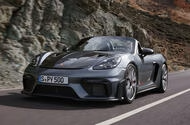Why Is Porsche Slowing Down Its Electric Vehicle Push?
If you’ve been following the automotive world, you’ve probably noticed that Porsche has been one of the loudest voices championing electric vehicles (EVs). But recently, the brand has made a surprising pivot. So, what’s behind this change of heart?
According to Porsche CEO Oliver Blume, the company has seen a clear drop in demand for exclusive battery-electric cars. This isn’t just a Porsche problem—luxury automakers across the board are feeling the pinch, especially in key markets like China, where demand for high-end goods has cooled dramatically. Add to that the sting of increased tariffs on imported cars in the US, and it’s easy to see why Porsche is rethinking its strategy.
The outcome? Porsche is now betting on flexibility. Instead of going all-in on electric, the company is doubling down on a mix of combustion engines, plug-in hybrids, and EVs. This approach, Blume says, gives Porsche a strong position to weather changing market conditions and customer preferences.
Will There Still Be Petrol-Powered Porsche 718 Boxster and Cayman Models?
For fans of the iconic 718 Boxster and Cayman, there’s good news. Porsche has confirmed that the next generation of these beloved sports cars will still offer a combustion engine option—at least for the top-tier versions. While details are still under wraps, it’s likely that the high-performance RS and GT4 RS models will continue with petrol power, while entry-level variants may go fully electric.
This move is a nod to Porsche’s heritage and the passionate community of drivers who crave the visceral experience of a petrol engine. It’s also a smart business decision, considering the uncertain pace of EV adoption in the sports car segment.
What’s Happening With Porsche’s Upcoming SUVs?
Porsche’s SUV lineup is also getting a major shakeup. The much-anticipated ‘K1’ luxury SUV, which was originally planned as a flagship electric model, will now launch with combustion engine and plug-in hybrid options instead. The company has put the dedicated SSP Sport electric platform on ice until well into the 2030s, taking a hefty €1.8 billion write-down in the process.
But that’s not all. Porsche is preparing to introduce a new ‘M1’ SUV, which will be its first production car with a front-biased all-wheel-drive system. Based on the third-generation Audi Q5’s Premium Platform Combustion (PPC) architecture, the M1 is being fast-tracked to market in just three years—a significant acceleration compared to Porsche’s usual five-year development cycle.
How Will This Affect Porsche’s Profitability and Long-Term Plans?
The strategic realignment comes at a cost. Porsche expects its net profit margin to dip to around 2% this year, a sharp drop from previous years. However, the company is optimistic about the future. With a more diverse product lineup—including combustion, hybrid, and electric models—Porsche aims to bounce back to double-digit profit margins in the medium term.
This isn’t just wishful thinking. Industry analysts point out that flexibility is key in today’s rapidly evolving automotive landscape. By keeping its options open, Porsche can adapt to shifting regulations, consumer preferences, and technological breakthroughs without being locked into a single path.
Is Porsche Still Committed to Electrification?
Absolutely. While Porsche is slowing its EV rollout, it’s not abandoning electrification. The company is about to launch the new Cayenne Electric, built on Volkswagen Group’s cutting-edge 800V Premium Platform Electric (PPE) architecture. The Macan Electric is already on sale, and Porsche remains committed to developing battery-powered models for customers who want them.
Blume emphasizes that electrification excites a specific and growing customer group. The goal now is to offer choice—whether that means the instant torque of an EV, the range and familiarity of a hybrid, or the classic roar of a flat-six.
What Does This Mean for Porsche Enthusiasts and Buyers?
For Porsche fans, this new strategy is a win-win. If you love the sound and feel of a petrol engine, you’ll still have options—especially in the brand’s most iconic models. If you’re ready to embrace electric, Porsche will have you covered there, too.
It’s a pragmatic approach that recognizes the automotive world isn’t one-size-fits-all. As regulations, technology, and consumer tastes continue to evolve, Porsche is positioning itself to deliver the right car for every kind of driver.
The Big Picture: Why Porsche’s Flexible Approach Matters
Porsche’s decision to slow its EV push and keep petrol and hybrid options alive isn’t just about hedging bets—it’s about meeting customers where they are. The automotive industry is in the midst of a seismic shift, but the road to electrification is anything but straight.
By offering a compelling mix of powertrains, Porsche is making sure it can serve enthusiasts and newcomers alike, whatever the future holds. It’s not rocket science—just smart, customer-focused thinking. And in a world where change is the only constant, that might be the most powerful engine of all.

